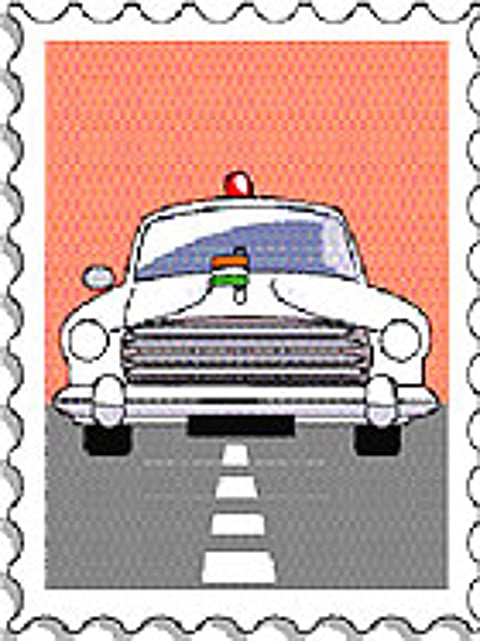Year 67
Delhi Diary
Because leftists have allegedly distorted how we interpret the past, it does not mean the PM should give encouragement to beliefs which are laughable.

As India celebrates its 67th birthday, the time couldn’t be more perfect to take the pulse of the nation. Of course, mine is a subjective diagnosis, but it may not be totally off the mark.
In a world full of conflicts, we should consider ourselves fortunate to be in such a good shape. Especially since most of the turmoil is in our neighbourhood and therefore does not have far to travel. Besides, we have a new government and a new prime minister, whose style of governance still seems ‘alien’ to me. The republic being relatively stable, we have to thank our institutions and the people who run them. The higher judiciary, the media, civil society and the Election Commission are all standing up bravely, fighting the pressure being put on them.
But prime minister Narendra Modi remains an enigma. Hardly a day passes without some mantra or 10-point programme being passed on to the senior, responsible citizens to enable them to become more efficient bureaucrats, policemen or entrepreneurs. Sometimes, what is suggested sounds trite, but one knows it is deadly serious. Indians need to be treated as grown-ups. They don’t have to be spoon-fed.
For a leader with a progressive, forward-looking image, it is surprising that the prime minister is so tolerant with ‘scholars’ like Dina Nath Batra and the new chairman of the Indian Society for Historical Research, Y.S. Rao. Simply because leftists have allegedly distorted how we interpret the past, it does not mean he should give encouragement to beliefs which are laughable.
Of course, in the area of mathematics and astronomy, ancient India has much to offer. It is when we get into insisting that stem cell technology existed in the Vedic period that the debate is reduced to farce.
Nice niece
I have yet to meet a more tranquil and optimistic person than Nayantara Sahgal. This niece of Jawaharlal Nehru, now 87, remains uncorrupted by power. Deliberately and without regret, she decided to stay out of its embrace and opted to concentrate on her writing. Some years ago, at Woodstock in Mussoorie, I had the honour to introduce her. I said that novelists and intellectuals are suckers for being seduced by power. I gave the example of Norman Mailer, a journalist who detested President Johnson for pushing the United States into the Vietnam war and led a protest movement against him, to eventually accept the proposition when Johnson invited him to a banquet at the White House, saying he was going in his capacity as a curious journalist. A bogus argument.
Recently, I attended Nayantara’s book launch. All her best qualities were visible there. She rejects cynicism and defeatism. There is an endearing simplicity about her work and her belief that India, after some detours, will return to being the country that Nehru envisioned—tolerant, open and civilised.
Journey within
I just finished writing 90,000 words for the second volume of my autobiography Editor Unplugged (Penguin) and I now feel like a man released from captivity. Starting a book is easy, but finishing it is not. Autobiographies are more difficult to write than fiction stories or biographies; on every page, the author has to put down a bit of his soul for the reader. Every lie, half-truth, amplification and evasion jars, making the prose opaque and the argument unconvincing. Every truth you tell reveals the kind of person you are. It is damnably demanding and exhausting. On many days, I was lucky to get 400 words down. The painfully slow speed at which the manuscript progresses makes you wonder if you will ever reach the end.
The part of the autobiography I struggled with the most concerned self-examination: the kind of person I am, the kind of person I want to be. This self-exploration meant going into spaces of my personality I had never entered before. When I did, it was a mitigated experience.
Bertrand Russell published a three-part autobiography that I considered as ‘model’. He was ruthless with himself, sharing all of his motives, his instincts. I have attempted something similar, with much less success, of course.
An offer hard to refuse
Coppola’s Godfather I is fast overtaking Citizen Kane as the best film ever made. I was surprised to learn that Coppola first offered Don Vito Corleone’s role to Laurence Olivier. It is only when he refused that he approached Brando. Also, Coppola had initial misgivings about taking up the project. He didn’t want to make a gangster movie and he had a low opinion of Mario Puzo’s novel.
Last week...
I read Dola Mitra’s biography of Mamata Banerjee, Didi. It is gripping.
Vinod Mehta is editorial chairman, Outlook, and its founding editor-in-chief; E-mail your diarist: vmehta [AT] outlookindia [DOT] com
Tags